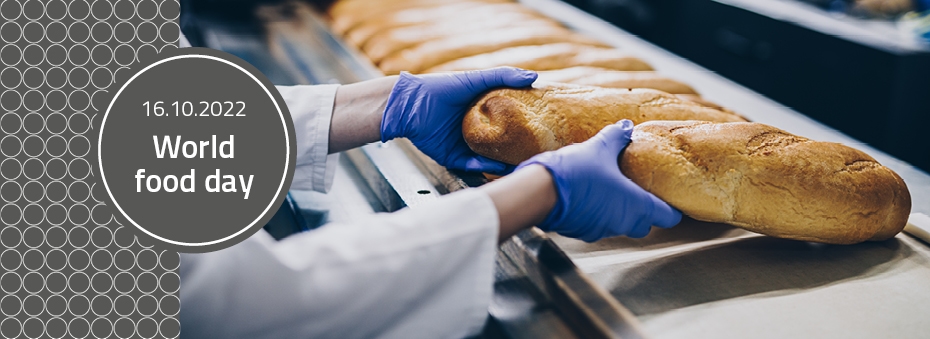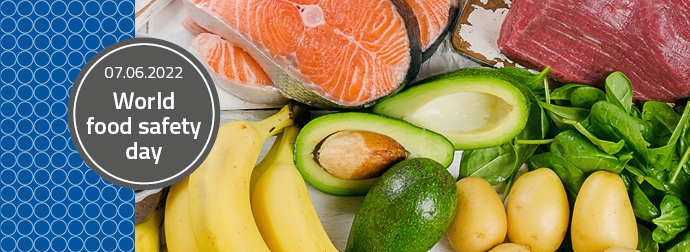
Microbiología
Kits de ensayo para la detección de contaminación microbiológica
Microbiología
Los alimentos contaminados con microorganismos (bacterias, levaduras, virus) pueden suponer un riesgo para el consumidor. Además de la detección de microorganismos patogénicos, es importante mantener el control de los organismos que favorecen habitualmente la descomposición para reducir pérdidas durante la producción.
Los microorganismos son criaturas de tamaño microscópico, organizados principalmente como organismos unicelulares, aunque en algunos casos pueden ser multicelulares. Abundan en el entorno natural (agua, suelo, aire, etc.). Los microorganismos pueden estar presentes de forma natural en los alimentos o las superficies de los alimentos (por ejemplo, verduras frescas) o haber sido agregados debido a una contaminación durante el proceso de elaboración de los productos alimentarios (por ejemplo, higiene insuficiente durante el procesamiento de carne).
En la industria alimentaria se puede distinguir entre varias categorías de contaminación microbiológica:
No se debe permitir la presencia de microorganismos patogénicos en los alimentos, o bien deben estar limitada a un número especificado de células por gramo de alimento. Estos límites difieren en función de la matriz alimentaria. (Para obtener más información, visite el sitio web de DGHM). Si los límites se superan, las consecuencias para la salud del consumidor podrían ser considerables. Por lo tanto, se prevé un nivel de tolerancia cero por 25 g de muestras de alimento para la mayoría de los patógenos más frecuentes (Salmonella, Campylobacter, E. coli, etc.).
En general, es posible diferenciar entre dos métodos de análisis microbiológicos: análisis de alimentos y control de la limpieza/higiene.
Detección de microorganismos en el entorno de producción
Los ensayos microbiológicos para control de limpieza e higiene permiten detectar residuos generales de alimentos en superficies insuficientemente limpias en el entorno de producción. Estos residuos de nutrientes son la base para el crecimiento de microorganismos.
El recuento de colonias en los alimentos y superficies se puede realizar mediante las placas Compact Dry listas para su uso. Las placas Compact Dry están disponibles para 13 parámetros diferentes de análisis. El método básico general de los análisis con Compact Dry es el cultivo de microorganismos en medios nutrientes estándar. El principio de la prueba se basa en sustratos cromogénicos específicos cuyo color cambia a causa del metabolismo de los microorganismos. Además del análisis de muestras de alimento diluidas, Compact Dry también es adecuado para hisopado de muestras en superficies o la incubación de filtros de membrana tras el filtrado de muestras líquidas.
Los residuos de alimentos sobre superficies se pueden detectar mediante ensayos de proteínas (RIDA®CHECK) o mediciones de ATP (LuciPac™Pen). La determinación de las proteínas describe aproximadamente la fase de contaminación mediante el cambio de color del reactivo de detección colorimétrico. Sin embargo, la cantidad relativa de ATP (adenosín trifosfato) o AMP (adenosín monofosfato) respectivamente se puede medir con mucha precisión. Se registra una reacción de bioluminiscencia especial que requiere la presencia de ATP o AMP en un luminómetro especial (Lumitester™ PD-20). Ambos sistemas son adecuados para un control regular de la eficiencia de los procedimientos de limpieza. Estos controles garantizan el mantenimiento de la higiene industrial general. Las superficies que están higiénicamente limpias pueden reducir el riesgo de contaminación del producto.
| Compact Dry | RIDA®STAMP | RIDA®CHECK | Lumitester™ PD-30 |
|---|---|---|---|
| Placas de nutrientes listas para su uso | Placas de agar listas para su uso | Prueba de proteínas | Mediciones de ATP/AMP |
| Recuento microbiano sobre superficies y en muestras de alimentos diluidas | Recuento microbiano sobre superficies planas en el entorno de producción y sobre alimentos sólidos | Hisopado para la detección de residuos alimentarios sobre superficies | Detección de residuos alimentarios sobre superficies |
| Sencillo y seguro | Fácil de usar y evaluar | Método rápido y fiable | Uso rápido y cómodo mediante LuciPac®Pen con hisopo integrado |
Detección de microorganismos en los alimentos
Los residuos tóxicos de las bacterias en las muestras de alimentos y bebidas se pueden analizar con los kits de ensayo para toxinas bacterianas. Los formatos habituales de prueba para análisis microbianos alimentarios son los ensayos ELISA, los ensayos de PCR en tiempo real, las placas de nutrientes y las placas de agar.
Para la detección de bacterias patogénicas hay disponibles métodos inmunológicos (ELISA). Los ensayos RIDASCREEN® se basan en la tecnología sandwich, en la que el antígeno (proteína de la superficie bacteriana) se captura en el pocillo de la microplaca y se detecta al añadir un segundo anticuerpo marcado con una enzima de detección especial. La detección inmunológica requiere procedimientos de enriquecimiento previo adecuados dependiendo del tipo de bacteria patógena.
La detección de las toxinas bacterianas se puede realizar directamente a partir de muestras alimentarias (RIDASCREEN® SET Total y RIDASCREEN® SET A, B, C, D, E), o bien utilizar para detección indirecta de bacterias patogénicas productoras de toxinas (RIDASCREEN® Verotoxin), después de haber realizado el enriquecimiento previo apropiado.
La identificación de los virus y bacterias patogénicas se puede llevar a cabo mediante sistemas biológicos moleculares, como los kits de PCR en tiempo real y alta especificidad de la gama SureFast® PATHOGEN. El sistema modular consiste en un sistema de preparación de ADN optimizado gracias a las columnas con filtro Spin y a la conocida tecnología de sonda de hidrólisis TaqMan combinada con tinciones FAM a efectos de detección. Se puede combinar con todos los tipos de termocicladores de PCR en tiempo real más utilizados. El control interno de amplificación se integra en todos los kits PLUS. La elección apropiada de la tinción de control de amplificación depende del tipo de termociclador en el que se vaya a aplicar la reacción.
| RIDASCREEN® | SureFast® | Compact Dry | RIDA®STAMP |
|---|---|---|---|
| Prueba inmunológica (ELISA) | Prueba biológica molecular (PCR en tiempo real) | Placas de nutrientes listas para su uso | Placas de agar listas para su uso |
| Para la detección de bacterias y toxinas bacterianas | Para la detección de bacterias y virus | Recuento microbiano sobre superficies y en muestras de alimentos diluidas | Recuento microbiano sobre superficies planas y en alimentos sólidos |
| Método rápido y fiable | Extremadamente específica y rápida; adecuada para cualquier tipo de termociclador de PCR estándar | Sencillo y seguro | Fácil de usar y evaluar |
Product portfolio
| Producto | Descripción | No. of tests/amount | Art. No. |
|---|---|---|---|
| Compact Dry PA |
Compact Dry PA is a simple and safe test procedure for the determination and quantification of Pseudomonas aeruginosa counts in foods, cosmetics, water samples or pharmaceutical materials. The ready-to-use plates consist of a special 50 mm diameter … Lee más |
100 nutrient plates | HS9491 |
| Compact Dry YMR |
Usage of Compact Dry YMR (rapid) is a simple, safe and fast test procedure for determination and quantification of yeasts and molds in foods or raw materials – as well as pharmaceutical raw materials. The ready-to-use plates consist of a special 50 … Lee más |
100 nutrient plates | HS9801 |
| Compact Dry AQ |
Usage of Compact Dry AQ is a simple and safe test procedure for determination and quantification of heterotrophic water bacteria from water samples (drinking and ultrapure water). The ready-to-use plates consist of a special 50 mm diameter petri dish … Lee más |
100 nutrient plates | HS9541 |
| Compact Dry ETC |
Usage of Compact Dry ETC is a simple and safe test procedure for determination and quantification of Enterococcus in foods and water samples. The ready-to-use plates consist of a special 50 mm diameter petri dish containing a detection specific … Lee más |
100 nutrient plates | HS9461 |
| Compact Dry BC |
Usage of Compact Dry BC is a simple and safe test procedure for determination and quantification of Bacillus cereus in foods or raw materials. The ready-to-use plates consist of a special 50 mm diameter petri dish containing a detection specific … Lee más |
100 nutrient plates | HS9721 |
| Compact Dry X-SA |
Usage of Compact Dry X-SA is a simple and safe test procedure for determination and quantification of Staphylococcus aureus in foods, cosmetics or raw materials – as well as pharmaceutical raw materials. The ready-to-use plates consist of a special … Lee más |
100 nutrient plates | HS9621 |
| Compact Dry YM |
Usage of Compact Dry YM is a simple and safe test procedure for determination and quantification of yeasts and molds in foods or raw materials – as well as pharmaceutical raw materials. The ready-to-use plates consist of a special 50 mm diameter … Lee más |
100 nutrient plates | HS8801 |
| Producto | Descripción | No. of tests/amount | Art. No. |
|---|---|---|---|
| GEN-IAL® QuickGEN Wild yeast 2 |
Detection of wild yeast in beverages by real-time PCR. The following yeasts are detected: Candida glabrata Candida albicans Candida kefyr Candida intermedia Candida parapsilosis Candida sake Candida tropicalis Naumovozyma dairenensis Pichia … Lee más |
50 reactions | Q535 |
| GEN-IAL® QuickGEN Wild yeast 1 low |
Detection of wild yeast in beverages by real-time PCR. The following yeasts are detected: Dekkera anomala Dekkera bruxellensis Dekkera custersiana Dekkera naardenensis Debaromyces hansenii Hanseniaspora guillermondii Hanseniaspora osmophila … Lee más |
48 reactions | Q522 |
| SureFast® Salmonella Species/Enteritidis/Typhimurium 4plex |
The SureFast® Salmonella Species/Enteritidis/Typhimurium 4plex is a multiplex real-time PCR for the direct, qualitative detection and differentiation of Salmonella spp., Salmonella Enteritidis and Salmonella Typhimurium. Each reaction contains an … Lee más |
100 reactions | F5166 |
| GEN-IAL® QuickGEN P1 Screening |
Qualitative detection of bacterial (Lactobacillus/ Pediococcus / Megasphaera / Pectinatus) and yeast contaminations in filtrated beer and beer mixes. For products with high amount of yeast use the Screening Kit without yeast detection to find … Lee más |
48 reactions | Q021, Q022, Q023, Q024, Q025 |
| GEN-IAL® QuickGEN Enterobacteriacea spp. |
Qualitative real.time PCR-detection of Enterobacteriaceae as indicators for hygiene and postprocessing contaminations. The system contains an integrated inhibition control. Lee más |
50 reactions | Q143, Q145 |
| GEN-IAL® QuickGEN Yeast Saccharomyces diastaticus low |
Detection of Saccharomyces diastaticus in beverages by real-time PCR. Lee más |
48 reactions | Q182 |
| GEN-IAL® QuickGEN P1 and S. diastaticus Screening |
Qualitative detection of bacterial and S.diastaticus contaminations in filtrated beer and mixed beer drinks and yeast containing samples. Lee más |
48 reactions tube strips (freeze-dried, incl. IC-DNA and lyticase) |
Q041, Q042, Q043, Q044, Q045 |
| GEN-IAL® QuickGEN Yeast differentiation |
Differentiation of 12 beer spoilage yeasts in beer and mixed beer drinks. The following yeast are differentiated: Saccharomyces exiguus Saccharomyces cerevisiae var. diastaticus Saccharomyces bayanus / pastorianus Saccharomycodes ludwigii … Lee más |
96 reactions for 12 samples (tubes contain lyticase). | Q541, Q542, Q543 |
| SureFast®STEC Screening PLUS |
The SureFast® STEC Screening PLUS is a real-time PCR for the direct, qualitative detection of DNA sequences of the virulence factors stx1 (subtype a-d) and stx2 (subtype a-g) of Escherichia coli (STEC). Each reaction contains an internal … Lee más |
100 reactions | F5105 |
| SureFast® Hepatitis E PLUS |
SureFast® Hepatitis E PLUS is a real-time RT-PCR for the direct and qualitative detection of hepatitis E virus. The test contains an Internal Control RNA (ICR, consisting of MS2-bacteriophage) as an internal control of sample preparation procedure … Lee más |
100 reactions | F7142 |
| GEN-IAL® QuickGEN Yeast Wickerhamomyces anomalus |
Detection of Wickerhamomyces anomalus in beverages (e.g. beer, wine, grape must) by real-time PCR. Lee más |
50 reactions | Q175 |
| GEN-IAL® QuickGEN® Yeast Top fermented high |
Real-time PCR-Kit for the detection of top-fermented yeast. Lee más |
48 reactions | Q151 |
| GEN-IAL® QuickGEN Yeast Bottom fermented high |
Detection of bottom-fermented yeast in beverages by real-time PCR. Lee más |
48 reactions | Q161 |
| GEN-IAL® QuickGEN Pectinatus / Megasphaera differentiation low |
Real-time PCR-Kit for the detection of Pectinatus spp. and Megasphaera spp in beverages. Lee más |
48 reactions | Q112 |
| GEN-IAL® QuickGEN Hop resistance |
Qualitative detection and differentiation of the hop resistance genes hor A / hor C / hit A and ORF 5 as genetic markers for beer-spoilage microorganisms. Lee más |
50 reactions | Q105 |
| GEN-IAL® Biogenic amines |
Real-time PCR kit for the detection of biogenic amines producing lactic acid bacteria in wine. Lee más |
50 reactions | Q345 |
| SureFast® Enterobacteriaceae Screening PLUS |
The test detects Enterobacteriaceae DNA. Each reaction contains an internal amplification control (IAC). Lee más |
100 reactions | F5507 |
| SureFast® Parasitic Water Panel 4plex |
The SureFast® Parasitic Water Panel 4plex is a multiplex real-time PCR for the direct, qualitative detection and differentiation of Giardia intestinalis, Entamoeba histolytica and Cryptosporidium spp.. Each reaction contains an internal … Lee más |
100 reactions | F5506 |
| SureFast® Legionella 3plex |
The SureFast® Legionella 3plex is a real-time PCR for the direct, qualitative detection of Legionella spp. and Legionella pneumophila. Each reaction contains an internal amplification control (IAC). Lee más |
100 reactions | F5505 |
| SureFast® Vibrio 4plex |
The SureFast® Vibrio 4plex is a multiplex real-time PCR for the direct, qualitative detection and differentiation of Vibrio cholerae, Vibrio parahaemolyticus and Vibrio vulnificus DNA. Each reaction contains an internal amplification control (IAC). Lee más |
100 reactions | F5161 |
| SureFast® Pseudomonas aeruginosa PLUS |
The SureFast® Pseudomonas aeruginosa PLUS is a real-time PCR for the direct, qualitative detection of a specific DNA sequence of Pseudomonas aeruginosa. Each reaction contains an internal amplification control (IAC). Lee más |
100 reactions | F5503 |
| SureFast® Escherichia coli PLUS |
The test detects Escherichia coli DNA. Each reaction contains an internal amplification control (IAC). Lee más |
100 reactions | F5157 |
| SureFast® Cronobacter sakazakii PLUS |
SureFast® Cronobacter sakazakii PLUS is a real-time PCR for the direct, qualitative detection of Cronobacter sakazakii DNA. Each reaction contains an internal amplification control (IAC). Lee más |
100 reactions | F5115 |
| GEN-IAL® QuickGEN Biofilm |
Real-time PCR detection of Leuconostoc mesenteroides, Lactoccocus lactis and Wickerhamomyces anomalus, which are involved in the development of biofilms. Lee más |
50 reactions | Q095 |
| GEN-IAL® QuickGEN Alicyclobacillus differentiation |
Qualitative detection and identification of Alicyclobacillus spp., Alicyclobacillus acidocaldarius and Alicyclobacillus acidoterrestris. Lee más |
48 reactions | Q721, Q723, Q724, Q725 |
| GEN-IAL® QuickGEN Dekkera bruxellensis quantitative |
Qualitative and quantitative detection of Dekkera bruxellensis in wine and grape must. Lee más |
48 reactions | Q371, Q372, Q373, Q375 |
| SureFast® Emetic Bacillus cereus PLUS |
The SureFast® Emetic Bacillus cereus PLUS is a real-time PCR for the direct, qualitative detection of a specific cereulide synthetase DNA sequence of the emetic Bacillus cereus. Each reaction contains an internal amplification control (IAC). Lee más |
100 reactions | F5127 |
| GEN-IAL® QuickGEN Yeast Zygosaccharomyces bailii high |
Detection of Zygosaccharomyces bailii in wine and grape must by real-time PCR. Lee más |
48 reactions (tubes incl. Lyticase and IC-DNA) | Q561 |
| SureFast® Clostridium perfringens PLUS |
The SureFast® Clostridium perfringens PLUS is a real-time PCR for the direct, qualitative detection of a specific alpha-toxin DNA sequence of Clostridium perfringens. Each reaction contains an internal amplification control (IAC). Lee más |
100 reactions | F5123 |
| SureFast® Clostridium botulinum Screening PLUS |
The SureFast® Clostridium botulinum Screening PLUS is a real-time PCR for the direct, qualitative detection of specific Botulinum neurotoxins (BoNT) A, B, E and F DNA sequences of Clostridium botulinum, Clostridium baratii and Clostridium butyricum. … Lee más |
100 reactions | F5110 |
| SureFast® Clostridium estertheticum PLUS |
The test detects Clostridium estertheticum DNA. Each reaction contains an internal amplification control (IAC). Lee más |
100 reactions | F5160 |
| SureFast® Salmonella ONE |
Salmonella spp. detection with real-time PCR Two in one – Salmonella test kit with included DNA preparation The kit is intended to be used for the fast and simple isolation and detection of Salmonella DNA from enrichment cultures. Each reaction … Lee más |
100 reactions | F5211 |
| SureFast® Salmonella PLUS |
The SureFast® Salmonella PLUS is a real-time PCR for the direct, qualitative detection of a specific DNA sequence of Salmonella spp.. The SureFast® Salmonella PLUS real-time PCR kit has been validated and certified in combination with the … Lee más |
100 reactions | F5111 |
| SureFast® EHEC/EPEC 4plex |
SureFast® EHEC/EPEC 4plex is a multiplex real-time PCR for the direct, qualitative detection and differentiation of DNA sequences of the virulence factors stx1 (subtype a-d), stx2 (subtype a-g), eae and the E. coli and Shigella spp. virulence factor … Lee más |
100 reactions | F5128 |
| SureFast® Legionella Screen PLUS |
The test detects Legionella spp. DNA. Each reaction contains an internal amplification control (IAC). Lee más |
100 reactions | F5502 |




